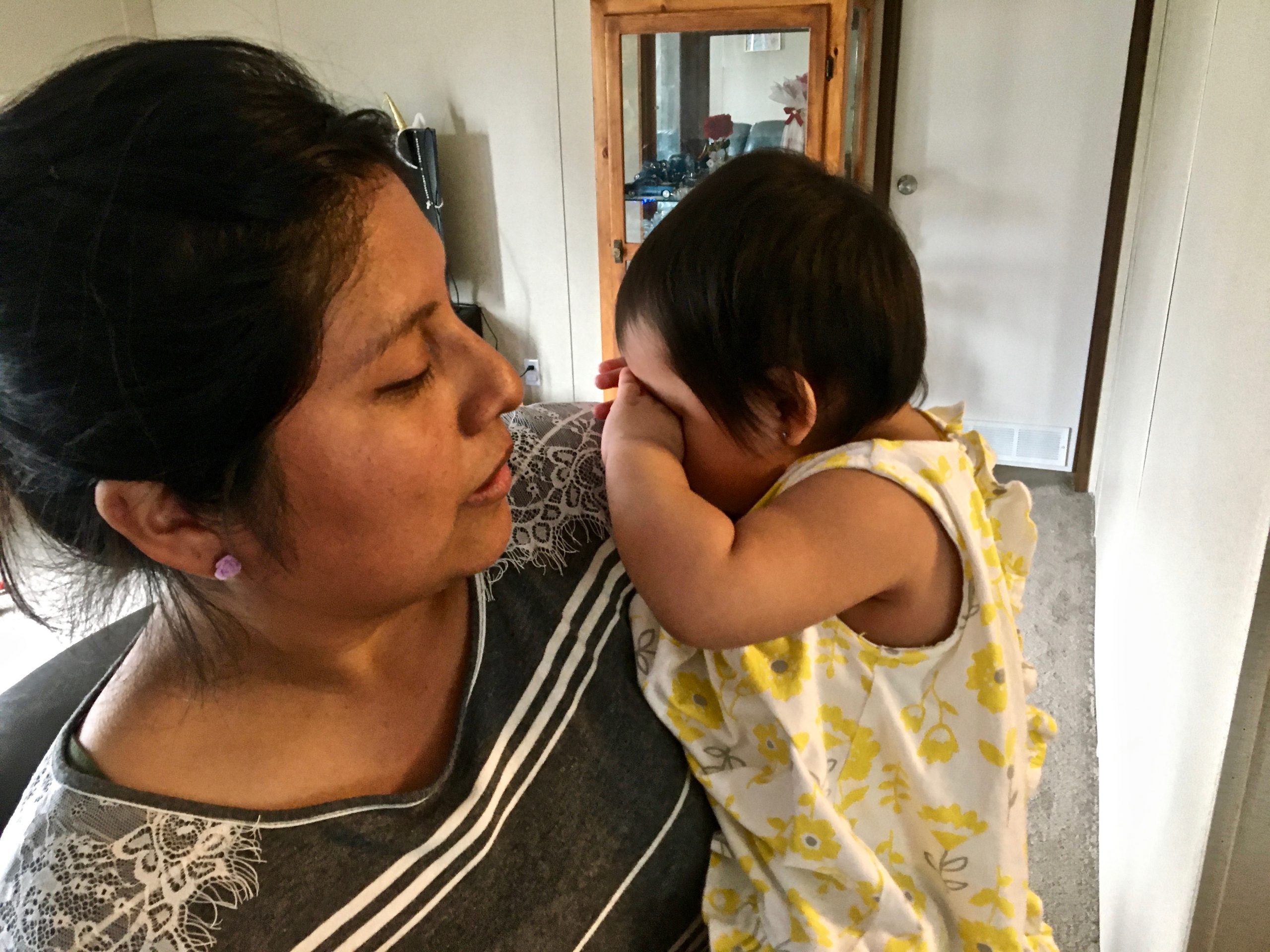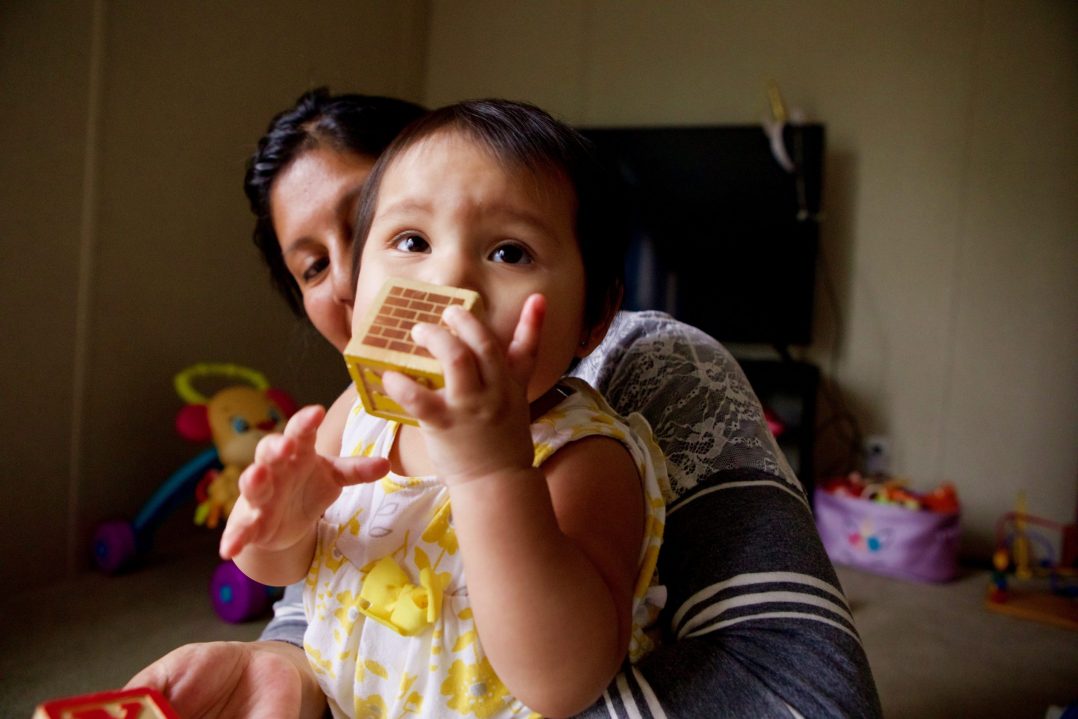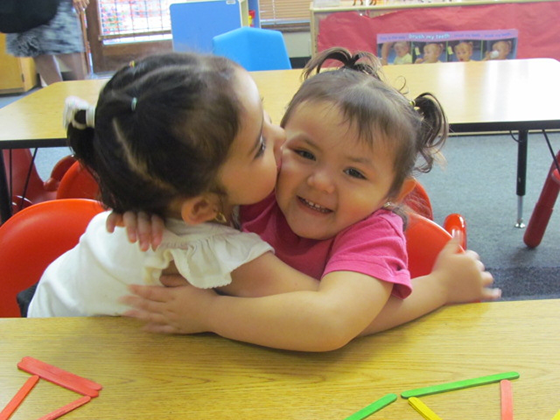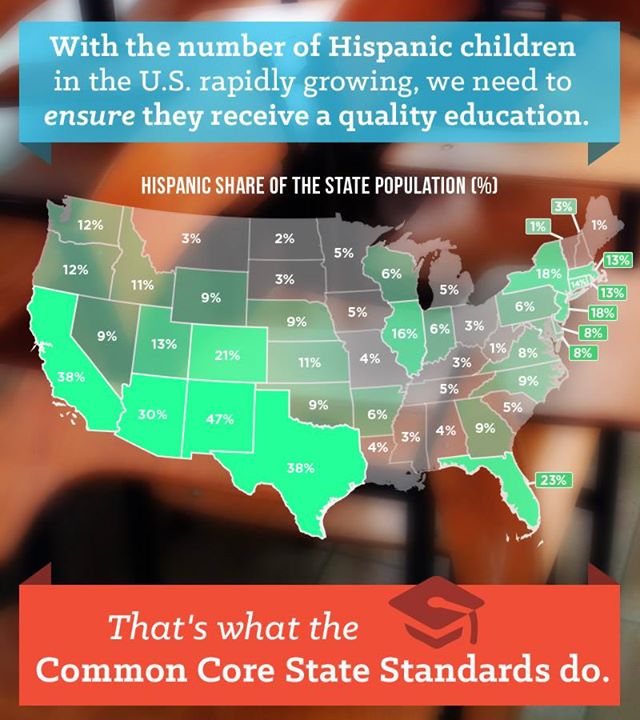Multimedia Report:
UnidosUS East Coast Migrant Head Start Project Knows Early Childhood Education Can’t Wait
Growing up as the child of migrant farmworkers in the 1950s and early 1960s, Jose Villa went through at least nine school systems—often several in the same year. He went wherever his parents could get him enrolled while they worked seasonal crops in Minnesota, Wisconsin, Michigan, Ohio, and Texas. And before he could even get to class, he had to feed, bathe, and dress his younger siblings, including preparing formula to feed the babies.
“That’s a lot of responsibility to put on a 10-year-old child,” says Villa.
He and his siblings were born too early to benefit from Head Start, a program that provides comprehensive child development services for low-income families started by the U.S. Office of Economic Opportunity in 1965. He defied the odds and became one of the few migrant farmworker kids in his generation to finish high school and go on to college. He eventually obtained his doctorate in education. Today, after decades as an educator and education policy advisor at the K-12 and college level, he’s a major advocate of providing educational and developmental supports to farmworker children and their families.
“I need to address the prenatal care of parents. I need to address the care of children zero to three so that they can be prepared, so that we can provide them with the tools to make that transition into public school,” says Villa, who has spent the past five years as the CEO of the
UnidosUS Affiliate East Coast Migrant Head Start Project. The organization serves some 2,300 children of farmworkers in 39 specialized schools and centers across Pennsylvania, New Jersey, Maryland, Virginia, North and South Carolina, Georgia, Florida, Alabama, and Mississippi. The organization’s programs include Early Head Start (EHS), which serves infants, and toddlers until children turn three and are ready to transition into Head Start or another pre-K program. The goal of EHS programs is to help families care for their infants and toddlers through early, continuous, intensive, and comprehensive services.

This winter, East Coast Migrant Head Start Project joined a broad effort to address the unique educational challenges this population faces. Working with UnidosUS and Think Babies™, an initiative created by ZERO TO THREE “to make the potential of every baby a national priority,” East Coast Migrant Head Start Project is exploring new ways to advocate on behalf of farmworker families, their young children and babies, including in North Carolina, home of its headquarters in Raleigh, the state’s capitol.
“We have a lot of political buy-in and yet we don’t have the funding. We need to keep reminding voters that this is important,” says East Coast Migrant Head Start Project Chief Innovation Officer Christine Alvarado. Additional funding would help to increase access and expand early childhood programs to meet the needs of more families.
North Carolina Early Education Coalition leads Think Babies™ NC, a statewide initiative that seeks to advance healthy beginnings, support families, and encourage quality early care and learning experiences. The initiative is driving to build public awareness and policymaker support for children age zero to three.The coalition has played a key role in successfully advocating for policies including executive orders by Governor Cooper to extend pregnancy accommodations and expand paid parental leave to state employees, establish a Full Count Census Committee, and include the NC Babies First pilot program in the Preschool Development Grant (PDG) planning grant to increase the number of infant-toddler child care slots available in the state. The coalition is also doing its part to address the changing demographics of the state and foster diversity within the coalition by reaching out to organizations like UnidosUS and East Coast Migrant Head Start.
According to ZERO TO THREE’s 2020 State of Babies Yearbook, Hispanic infants and toddlers represent 18.1% of the state’s youngest children ages zero to three, yet 33.5% live in poverty. Living in poverty affects children’s early development, and learning disabilities and developmental delays are more prevalent in young children living in poverty. This underscores the need to support Early Head Start as an evidence-based program that nurtures the healthy development of babies and toddlers in poverty to ensure that all children have equal opportunity to succeed.
The Coronavirus Aid, Relief, and Economic Security (CARES) Act, which was enacted in early April, provides $750 million in federal emergency support for Head Start during the pandemic, and North Carolina Early Education Coalition is “urging policymakers to provide additional funding and resources for the child care industry to assure the availability of emergency child care for essential workers and prevent the collapse of North Carolina’s early childhood education system.” UnidosUS also says that it’s likely more stimulus money will be needed, especially as this crisis drags on into the summer or early fall.
“The COVID-19 crisis has had a devastating impact on many of the support systems for our youngest children and families,” says Michele Rivest, policy director of the North Carolina Early Education Coalition. “Relief funding is desperately needed to support core pieces of our state’s infrastructure and to make sure more children have access to programs like Early Head Start and Head Start to support their well-being and development. The opportunity in this crisis is the chance to build a better system, one that ensures that all babies, no matter where they live, have what they need to thrive.”
In February, just prior to the widespread shutdowns for the pandemic, ProgressReport.co traveled to North Carolina to visit East Coast Migrant Head Start Project to learn more about the importance of engaging politicians and the public around early supports for migrant children. A few weeks later, ECMHSP made the difficult decision to temporarily shutter its centers, while a small emergency staff drove around delivering home learning materials to the families. They spent the rest of the spring strategizing on how to safely provide additional supports while reorganizing for an eventual reopening.
“Throughout more than four decades, this program has been vital to ensuring all children in America are equally prepared for their K-12 public education by providing early learning. We can’t afford to let migrant children fall behind in their educational trajectory and we owe it to them and their families to ensure that doesn’t happen,” says UnidosUS Education Policy Director Amalia Chamorro. “After all, in normal times and in crises like these, our farmworker families are the ones who ultimately keep our pantries stocked and food on our tables.”
Coming Alongside Farmworker Families
ProgressReport.co joined East Coast Migrant Head Start Project to meet farmworker parents like Elisa Reyes, a mother of four who has worked in a variety of crops in rural North Carolina for the past 17 years. She used to leave her kids with friends and neighbors, but a few years ago, she started to suspect her son had special needs that might require intensive interventions. She credits East Coast Migrant Head Start Project with diagnosing her then two-and-a-half-year-old son Jonathan with autism, a condition that also affects her 10-year-old son.
She says Jonathan didn’t speak at all when he entered the program.
“But now he talks and repeats a lot because they were stimulating him,” says Reyes. She says a lot of it came from intensive efforts to keep him engaged through singing and word play.
“He still sings the songs he learned there, he can repeat his ABC’s and he’s always active,” Reyes says.
It’s too soon to say whether Reyes’ infant daughter Julisa will also show signs of autism, but today, Reyes knows she can rely on East Coast Migrant Head Start Project educators to be monitoring for that. She also says the specialized childrearing tips boost her confidence as a mother. She says before she found East Coast Migrant Head Start Project, she felt like she was flying solo, never sure she was engaging her children in the right way.
“I try to get them to talk, talk, talk, all the time,” she says, “We sing while they’re bathing, and I never drive in silence. I put on music and they sing,” Reyes says.
Belinda Bowden, director of the East Coast Migrant Head Start Project center Jonathan attends in Faison, North Carolina, praises Reyes’s inquisitive nature.
“When she came in, she really wanted to understand what was going on with Jonathan, and by the teachers assessing him, they were able to share goals and strategies for her to work on,” she says.

Now four, Jonathan, receives ongoing evaluations to facilitate his transition into pre-K.
That’s the kind of streamlined care East Coast Migrant Head Start aims for, says Patti Kingery, the program’s North Carolina direct services administrator. Partnering with parents in shaping their children’s development and supporting parents’ skills and abilities to nurture their child’s learning and social and emotional development is a key element of the Early Head Start approach.
“We start from a very strength-based approach and we start from a place that parents are really the experts in who their own children are,” she says. “We have a team of staff at our centers that get to know families, get to know who they are, what they want for their babies, what their dreams are. And that’s where we start.”
Like the Think Babies™ initiative they’re now joining, the teachers focus on child bonding and early literacy, so important to early development. Engaging with babies around stories stimulates their brains to do both.
Donna Price, the early childhood education coordinator for East Coast Migrant Head Start’s school in Faison, North Carolina, has been working as a rural educator for more than 25 years. She grew up in the area and watched the demographics of the farmworker community shift from mostly Black and some White to predominately Latino in the mid-2000s. During that time, she says she’s learned a little Spanish and adapted her communication to fit the culture, but her base message to parents remains the same.
She wants them to know that no matter what life barriers they face, their role in bonding and nurturing care is key to their children’s brain development. She also reassures them that with the external supports her team provides, these parents have what it takes to put their children on a stable life path.
“How do I teach a baby?” is one of the most common questions parents ask her.
“You just talk to them. Pick up a book, read it to them,” she tells them, noting that babies respond to the stimulation of talking—in any language. And for those that can’t read, she provides picture books or even creates her own by clipping images from older books. This, she explains, is the first step toward critical thinking and literacy.
To further that effort, in May, UnidosUS partnered with the educational nonprofit First Book to provide $10,000 each to purchase and distribute 13,000 children’s books to UnidosUS Affiliates running the Migrant Head Start Project. The goal was to ensure that kids had a chance to practice early reading during the pandemic.

Price says parents and educators have another vital role to play in that practice. She says it’s part of the work that goes into making very small children feel loved, secure, and self-confident. That can be challenging anywhere, but especially in North Carolina, a southern state with a deep history of social and racial division.
Price says sometimes when she asks parents what dreams they have for their children, they tell her “I want them to be better than I am,” so she responds: “They need to be proud of who they are, but you (also) need to be proud of who you are because you came here to give your child a better life.” Early Head Start provides opportunities for the whole family, helping parents improve their prospects for financial stability while at the same time strengthening their children’s education.
Strategies like these gave mother Margarita Velasco a big boost in life. She was a migrant farmworker child who grew up attending East Coast Migrant Head Start Project in Florida and North Carolina. Today, she works as a certified nursing assistant at Wilmington Hospital in Western North Carolina. She and her farmworker husband have had two daughters in the program. One is now seven, and the other is just 11 months old.
“It helps my daughters grow and learn,” she says, noting that the school’s Spanish and English-instruction teachers have sometimes even put the two together to work on numbers and letters.
Instructors also give Velasco ideas for teaching those skills in her own rural and Mexican or Chicano cultural context. That could be getting outside to count sheep on the family farm or playing inside with lettered and numbered blocks in the family’s three languages. Velasco says English is her strongest language, while it’s Spanish for her husband. But she also gets her parents teaching her children sounds letters, and numbers in their native Mixteco.
This is vital in North Carolina, where people identifying as Hispanic or Latino now represent almost 10% of the overall population. That’s almost half the national average, notes the website Carolina Demography.
“Her speaking two languages—maybe even a third—she’ll be able to help others know where to get help and resources,” she says.
A Shared Mission

“East Coast Migrant Head Start Project has definitely continued to meet people where they are, and I think that’s one of the biggest keys,” says Sheila Arias, a former Early Head Start mom who now promotes Think Babies™ through her work as a state-wide Latina leader in the grassroots program Moms Rising or Mamás Con Poder.
Alvarado says she looks forward to collaborating with campaigns and programs like these.
“There are lots of early childhood advocacy organizations and support organizations in North Carolina. They don’t all focus on infants and toddlers,” explains Alvarado.
Both women attended a Think Babies™ NC conveningin late February, and then met a few days later to discuss ideas for bringing parents like Reyes and Velasco into the movement.
“Just getting that conversation started is really important here in North Carolina,” says Alvarado. “We have to be doing this work together.”
“What we advocate for is making sure that we can provide high-quality, center-based services for families who need a safe place for their very young child,” notes Kingery.
In other words, it’s a more intensive collaboration, more of that “it takes a village” approach.

“We know how to work with our families and we know how to build relationships with our families. That’s the foundation of what we do. It’s the foundation of any quality program for infants and toddlers,” says Alvarado.
Following Centers for Disease Control guidelines, East Coast Migrant Head Start Project will reopen its centers with a limited capacity on June 22. In addition to providing masks for children age 2 and over, daily temperature checks for anyone entering the facilities, self-contained meals, she says staff are creating a “peer health” promoter training program with a certificate to make the entire community “COVID aware.”
In that process, they are reminding everyone that community health is a shared responsibility.
“We have to keep saying to each other ‘we are only as safe as you are,'” she says.
As North Carolinians come out of the pandemic shutdown, dialogue about recent protests focused on social and racial justice, and prepare to go to the polls in November, Villa says that collaboration and village mentality should extend beyond the families and the educators participating in East Coast Migrant Head Start Project.
He says this is an important time for North Carolina residents to support them through civic engagement, such as writing or calling lawmakers about policies that affect farmworker children of diverse ethnic and racial backgrounds. He also encourages voters to keep those families in mind as they vote in a state that is deeply divided over such issues as immigration, education, and voter suppression.
“If the representatives and other governmental organizations are not doing what they should be doing on behalf of our population, then it’s your responsibility as a citizen of North Carolina to advocate for us,” says Villa.

ZERO TO THREE created Think Babies™ to make the potential of every baby a national priority. Funding partners for Think BabiesTMinclude the Robert Wood Johnson Foundation, which supports public education aspects, and the Perigee Fund, which supports public education and advocacy aspects. Learn more at www.thinkbabies.org.
-ProgressReport.co Editor Julienne Gage is the author of the blog post and producer of the feature video. UnidosUS consultant Jayme Gershen is the video’s editor and director of photography.




